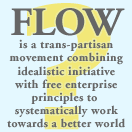|
|
FLOW originated from the experiences of two individuals:
John Mackey, co-founder of FLOW and co-founder of Whole Food Markets successfully brought an idealistic vision to reality when he grew Whole Foods into a Fortune 500 company. John’s experience is real-life proof that a business designed around idealistic principles can be enormously successful, commercially and personally.
Michael Strong, co-founder of FLOW and a pioneer in innovative education models, brings an uncompromising idealistic vision for the world. His methods have been successful in developing underprivileged students as complex, thinking human beings and demonstrating the profound potential for human flourishing through innovation in educational practices.
The FLOW philosophy arose from a conversation between John Mackey and Michael Strong that took place in the spring of 2002 at a restaurant in Austin, Texas. In that conversation John and Michael agreed that an idealistic vision of the future was critically important, that the old socialist idealistic vision was no longer appropriate or compelling, that markets, entrepreneurship, and voluntary activity provided a sounder foundation for actually realizing that idealistic vision, and that no existing market advocacy groups had adequately articulated an idealistic market-based vision of the future.
John and Michael both personally experienced the absence of an idealistic identity for do-gooders who believed that entrepreneurship and markets were the best way to make the world a better place. John and Michael further agreed on two key guideposts:
- That history, contemporary experience, and classical liberal political theory confirmed that the free flow of goods, services, people, capital, and information around the world was the most effective means of promoting global peace and prosperity. The FLOW perspective seeks to encourage entrepreneurs and leaders of all spheres to work together to create a fair, open global market in which free exchange raises incomes and enables people to work toward mutually beneficial goals in peace and prosperity.
- That the research and writings of Mihaly Csikszentmihalyi of the University of Chicago, as described in his book Flow: The Psychology of Optimal Experience provided a scientific basis for the conditions necessary for human fulfillment and happiness. Csikszentmihalyi’s work over three decades suggest that the engagement of human beings in voluntary activities under certain specific conditions is strongly conducive to human happiness and flourishing. The FLOW perspective seeks to replicate these conditions in the lives of people throughout the world.
Michael hosted an early conference in Angel Fire, New Mexico, in October of 2003 to further develop the mission and values of FLOW. It was at this conference that John proposed the name “FLOW”. Michael, John, and Bob Chitester of In The Classroom Media subsequently held several meetings with people around the country throughout 2004 to “test market” the FLOW concept. These meetings included Nobel laureates Milton Friedman and Gary Becker and television personality John Stossel. They continued to gather people interested in FLOW and held another conference over three days in October of 2004 at John Mackey’s ranch near Austin, Texas. This conference was attended by about 40 people and resulted in discussions that deepened the FLOW concept and began to link it to concrete plans and expectations. A loose plan for creating a FLOW organization was developed, seed money was pledged by the conference participants. Michael recruited a start-up team during the winter of 2004-2005 and the team began work on start-up tasks in March of 2005.
During the two years of early exploration of the FLOW concept, interest in FLOW expanded organically by means of word of mouth. Membership is growing at an increasing rate. Active members have generated significant discussion during FLOW’s short existence and have aided in developing an early identity for FLOW. This existing FLOW community is made up of a very diverse group of people from a wide range of ideological backgrounds, including open-minded libertarians, market-friendly social entrepreneurs, independents, a few conservatives, and a few left-leaning idealists who are seeking a new, more effective idealism. This list of early FLOW participants can be considered the founding members of the FLOW movement.
|

|

